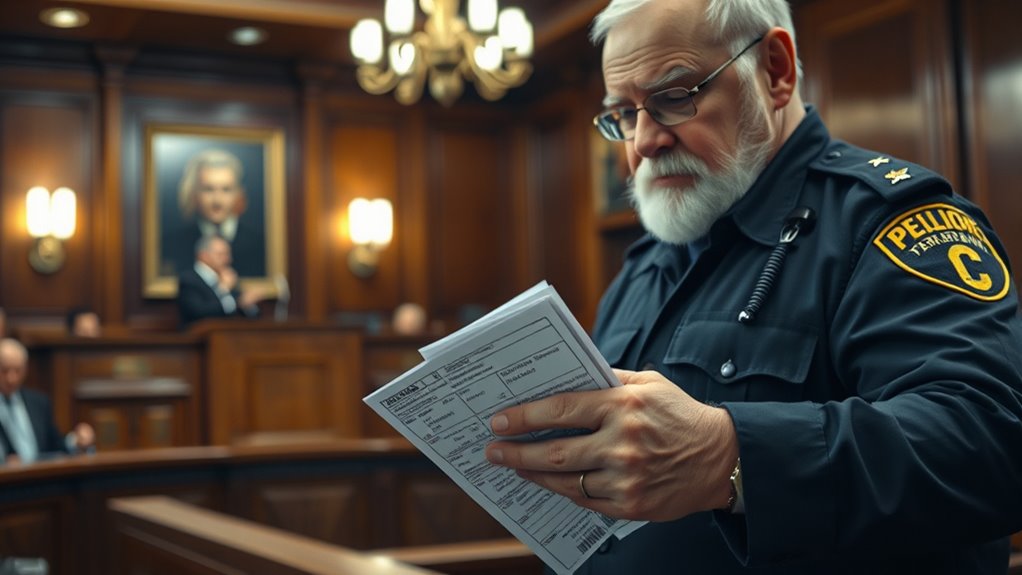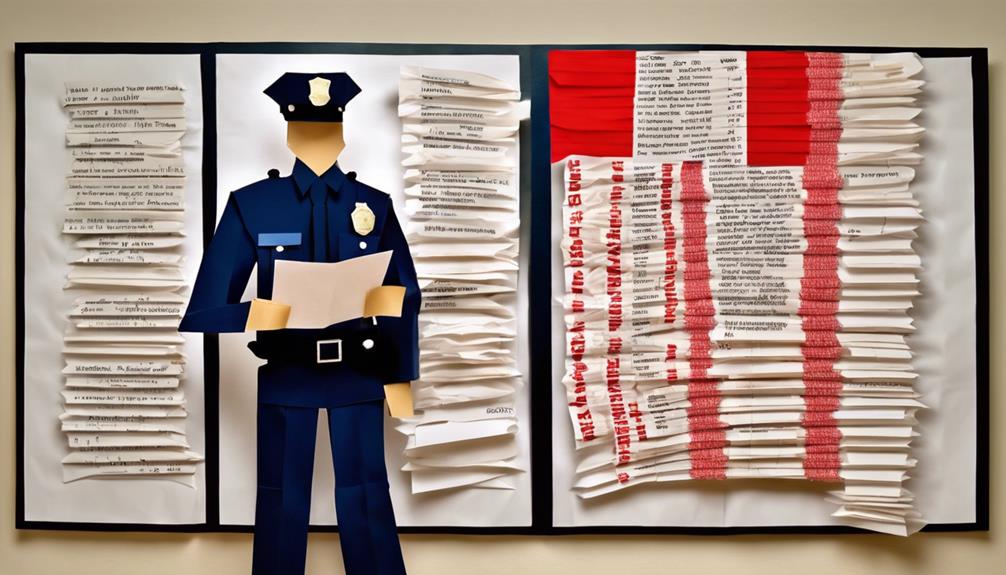Yes, you can be arrested for old traffic tickets if authorities have issued a warrant due to unpaid fines or missed court dates. Even years later, law enforcement can track down and detain you during traffic stops or home visits. Ignoring tickets increases the risk of warrant issuance and arrest delays. If you want to understand shocking cases where people were taken into custody for aging tickets, keep going to learn more.
Key Takeaways
- Unpaid traffic tickets can lead to arrest warrants if courts issue them for missed payments or court dates.
- Ignoring tickets may result in license suspension and increased legal penalties, raising arrest risks during traffic stops.
- Law enforcement can detain individuals during routine stops if there is an active warrant related to unpaid tickets.
- Serious violations or repeated unpaid fines increase the likelihood of warrant issuance and potential arrest.
- Promptly addressing traffic tickets helps prevent warrants, license issues, and possible arrest situations.

Have you ever wondered if you can get arrested for unpaid or old traffic tickets? The answer might surprise you. While most people think unpaid tickets just lead to fines or points on their license, the reality is that ignoring these tickets can escalate to more serious consequences. One of the primary ways authorities enforce unpaid tickets is through license suspension. When you fail to pay your fines or appear in court, the DMV or relevant agency may suspend your driver’s license until you settle the debt. This suspension isn’t just a minor inconvenience—it’s a legal penalty that can make driving legally impossible until you clear the issue. If you continue to ignore the suspension, it can lead to further penalties and complications.
But the most startling aspect is the potential for warrant issuance. When traffic tickets remain unpaid for a long time, courts can issue a warrant for your arrest. This isn’t automatic after a certain period but depends on the jurisdiction and the severity of the violation. Usually, if you miss a court date related to a traffic ticket or neglect to pay fines, the court may issue a bench warrant or arrest warrant. This warrant authorizes law enforcement officers to arrest you and bring you before the court. While warrants are typically issued for more serious traffic violations—like reckless driving or DUI—they can also be issued for unpaid tickets, especially if those tickets are linked to court appearances that you missed. Ignoring unpaid tickets over time can also lead to increased fines and additional legal actions.
Getting arrested because of old traffic tickets isn’t a common occurrence for minor violations, but it’s not impossible. Courts prefer to resolve unpaid tickets through fines and license suspensions, but if you ignore the situation long enough, arrest becomes a real possibility. This is why it’s essential to pay your tickets promptly or address any notices from the court. If you’re facing license suspension, you might find yourself unable to legally drive, which can impact your job and daily life. If a warrant has been issued, law enforcement can detain you during a traffic stop or even at your home if they track the warrant.
Ignoring old traffic tickets can lead to arrest, license suspension, and legal trouble if left unaddressed.
Ultimately, ignoring traffic tickets can lead to serious legal consequences that go beyond just paying fines. Warrant issuance and license suspension are tools courts use to enforce compliance, and they can result in arrest if left unresolved. So, it’s always better to handle your tickets early—either by paying them or appearing in court—to avoid the risk of arrest and additional penalties. Recognizing the importance of addressing outstanding tickets promptly can help you avoid unnecessary legal trouble.
Frequently Asked Questions
Do Unpaid Tickets Expire or Become Invalid Over Time?
Unpaid tickets don’t always expire, so ticket expiration varies by state and circumstances. If you ignore tickets long enough, a warrant issuance might happen, leading to potential arrest. Even if tickets seem old, authorities can still pursue collection or enforcement. To avoid trouble, check your local rules about ticket expiration and stay proactive—pay fines or address tickets before they turn into warrants that could cause serious issues.
Can a Warrant Be Issued for Unpaid Old Traffic Tickets?
It’s ironic, but yes, a warrant issuance can still happen for unpaid old traffic tickets. Even if you think the ticket’s validity has expired, courts can issue warrants if fines remain unpaid. This means you could be arrested over tickets you believed were long forgotten. Always check the status of your tickets; ignoring them doesn’t make them disappear and could lead to serious legal trouble.
Are There Legal Limits on How Long Tickets Can Be Enforced?
You might wonder if there are legal limits on ticket collection and enforcement timelines. Generally, enforcement timelines vary by state and type of ticket, but many places have statutes of limitations that restrict how long authorities can pursue unpaid tickets. After this period, tickets often become unenforceable, meaning you can’t be arrested or penalized for old traffic tickets. Always check your local laws to understand specific rules about enforcement limits.
What Are the Penalties for Ignoring Old Traffic Tickets?
Ignoring old traffic tickets can have serious consequences that threaten your driver safety and effective ticket enforcement. If you don’t address them, courts may escalate penalties, including fines, license suspension, or even arrest. The suspense grows as these overlooked violations accumulate, making it essential to resolve tickets promptly. Staying proactive ensures you avoid harsh penalties and keeps you on the road safely, maintaining your driving record’s integrity.
How Can I Resolve or Contest Old Traffic Violations?
To resolve or contest old traffic violations, start by researching your local traffic court procedures. You can often request a hearing to dispute the ticket if you believe it’s unjust. Alternatively, explore payment settlement options like paying overdue fines or setting up a payment plan. Contact your traffic court or visit their website to understand your options, guarantee you follow deadlines, and avoid further penalties or legal issues.
Conclusion
Remember, ignoring old traffic tickets can lead to serious consequences—you might even face arrest. In fact, approximately 10% of people with unpaid tickets have been detained for failure to resolve their violations. Don’t let a simple missed payment turn into a legal nightmare. Stay proactive by checking your record regularly and addressing tickets promptly. It’s your best shot at avoiding unnecessary arrest and keeping your record clean.









